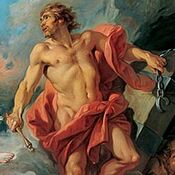World Literature 1, Spring 2020
| CRN 25677 | ENGL 2111.11 | MW 11–12:15 | COAS-210 | Spring 2020 |
World Literature I focuses on textual studies of the major genres of this period, epic and tragedy, how those genres influenced later literary works, and how they portray “humanist” issues throughout the Greek and Roman national literary traditions and beyond.
ENGL 2111 demonstrates the continued relevance of ancient works in understanding ourselves as “humans.” Major works covered will include Gilgamesh, the Iliad, the Odyssey, and works by Sophocles, Euripides, and Ovid. Since any survey course has much more literature than one semester-long class can cover, we will attempt to cover only a few works in as much detail as time allows, rather than many works only cursorily.
Introduction
The document you’re reading is your syllabus. Everything you need for this class is on this page and linked off of it. The tabs above access the major portions of the syllabus. Bookmark this page now and return here if you get lost or confused.[1] Use the tabs above to navigate to the various sections of the syllabus.[2]
Before you begin, take a moment and familiarize yourself with the general resources I have for students. All of these may be found in the “For Students” menu at the top of the page, or you can just begin on the student start page. These pages are designed to help you succeed in this class. While you may not read everything, you should know what’s available if you need it.
Please read this document and those it links to carefully at the beginning of the semester. There is much information to process, and it can be somewhat daunting — especially if you read cursorily. If you are confused, do your best to work through it by (re)reading this document carefully and completely, searching this site, or consulting the FAQ. I promise, there is an answer to your question. If all else fails, you may contact me. Trust yourself to follow directions and find the answers. Be careful and deliberate.
Course Information
This is a Core IMPACTS course that is part of the Humanities area
Core IMPACTS refers to the core curriculum, which provides students with essential knowledge in foundational academic areas. This course will help master course content and support students’ broad academic and career goals.
This course should direct students toward a broad Orienting Question:
- How do I interpret the human experience through creative, linguistic, and philosophical works?
Completion of this course should enable students to meet the following Learning Outcome:
- Students will effectively analyze and interpret the meaning, cultural significance, and ethical implications of literary/philosophical texts or of works in the visual/performing arts.
Course content, activities, and exercises in this course should help students develop the following Career-Ready Competencies:
- Ethical Reasoning
- Information Literacy
- Intercultural Competence
Notes
- ↑ While you may certainly choose to print it—we will do our best to follow the schedule hereon—it may change during the course of the semester due to unforeseen circumstances. Should this occur, I will let you know, but ultimately, this online document has the final say—not a printed one.
- ↑ You might, too, follow links by opening them in browser tabs—click the link by holding the ⌘ Command on a Mac or Ctrl on a PC—so you can easily return to where you left off.

